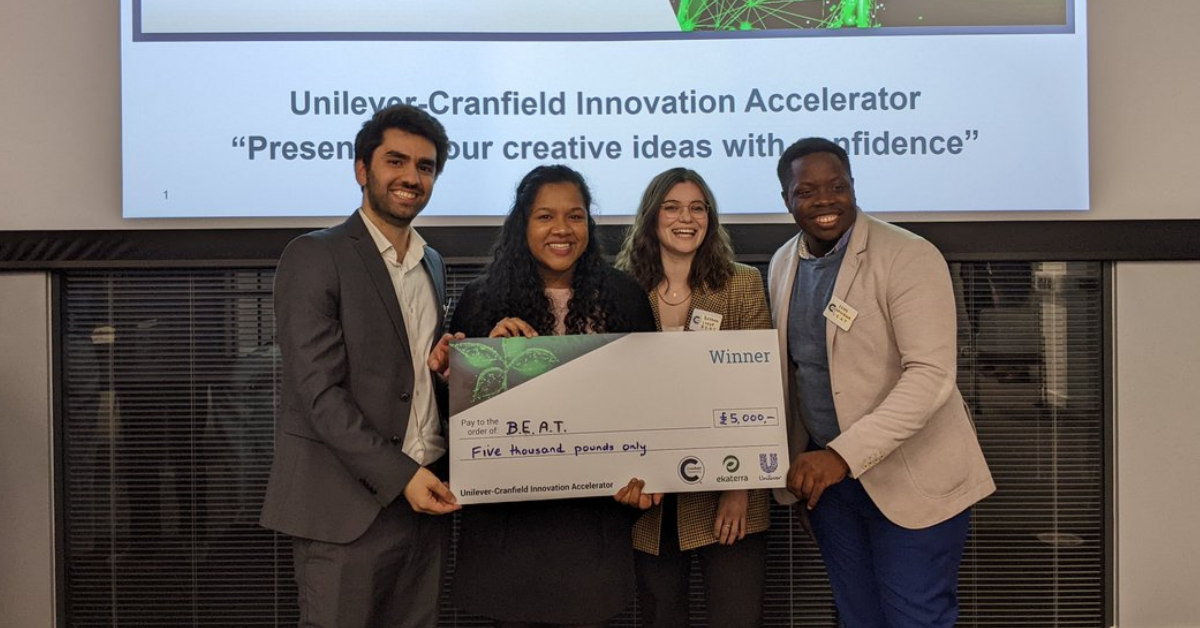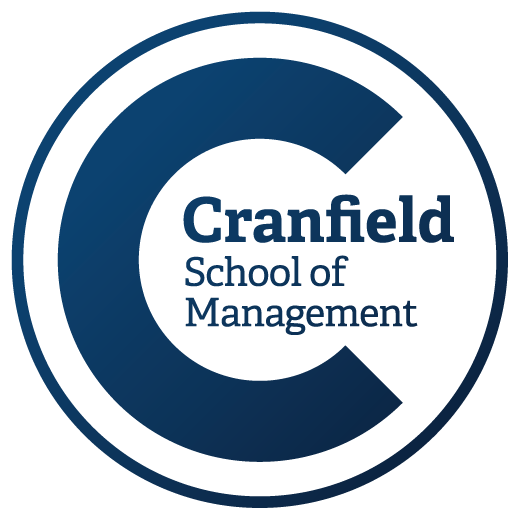Unilever Accelerator Challenge: Winning team B.E.A.T share their experience
29/04/2022

350 Cranfield University students were set real-world challenges from Unilever’s ice-cream and savoury foods categories and tea business, ekaterra. In the first three weeks of the challenge, the students formed teams from across University disciplines to develop ideas and problem-solve.
From 41 team submissions, 9 were shortlisted and went on to spend 6 intense weeks developing their solutions and proposals with coaching support from Cranfield’s Bettany Centre for Entrepreneurship, the Centre for Competitive and Creative Design, and School of Management and Energy academic mentors, alongside individual mentoring from Unilever and ekaterra.
The competition final saw each team given just seven minutes to pitch their ideas to an executive judging panel of experts from Unilever, ekaterra and Cranfield University. The judges were Unilever’s Global & EU Ice Cream Systems & Channels R&D Director, Roy Horne, ekaterra’s R&D Director Digital & Operations, Andreas Mayr and Cranfield’s Professor of Global Economy and Deputy Dean Economics and Banking, Joe Nellis.
The winning team, “B.E.A.T” (Axelle Lagaillarde, Elvis Mwesigwa, Bethan Lloyd, and Tarek Kobrosli) won the first prize of £5,000 for their innovative idea to reduce the carbon footprint of ice cream sales in developing and emerging countries, whilst simultaneously benefitting local communities.
The students in the winning team study in several different areas, coming from the Management and Corporate Sustainability MSc, Water and Sanitation for Development MSc and the Management and Entrepreneurship MSc courses.
In this blog, the winning team share their experience and provide some helpful tips for future students considering the Unilever Accelerator Challenge.
Can you tell us about the Unilever Accelerator Competition and how this has made a difference to your studies?
I am studying the Management and Corporate Sustainability MSc, and for me it has been an opportunity to implement some of the things we have learnt in class. Building on modules like Creating Sustainable Organisations and Applied Science and Technologies. My takeaways will be building a business case and confidence to communicate ideas.
Bethan Lloyd, Management and Corporate Sustainability MSc
What were your competition highlights?
The highlights of the Unilever competition include being able to follow the proposal through with the opportunity to get deeply invested and develop it how we wanted to. As a team, it has been great to come together from different courses and countries. We had a lot of fun becoming friends whilst working and learning from each other. We laughed a lot!
I would recommend the Unilever competition to prospective students as it’s a great way to connect and work with other students and mentors, and a rewarding challenge to be part of.
Bethan Lloyd, Management and Corporate Sustainability MSc
Why did you enter the Unilever Accelerator Competition and how do you think this competition will help your career?
I am studying the Management and Entrepreneurship MSc. I joined the Unilever Innovation Challenge as I wanted to prove to myself that I can be creative and innovative. I feel winning this competition will give me credibility in my future career. As I aspire to be an entrepreneur, such a reputable competition will give incubators/accelerators some confidence that I am innovative, hard-working and a team player.
Tarek Kobrosli, Management and Entrepreneurship MSc
What were your competition highlights?
The highlight of the project was the team experience. Our journey was full of laughter and enjoyment. Working with people from different courses has helped me look at the projects I work on in a different way. Bethan and Axelle made me look at sustainability in a serious way for the first time. With our combined efforts, Elvis and I tried to implement the social aspect of our projects. I also enjoyed the thrill of the competition on the final day, it was a great experience, and the best part was sharing it with my amazing team.
Tarek Kobrosli, Management and Entrepreneurship MSc
What have you learnt about yourself? Are there any areas of your personal and professional development that have been enhanced by competing in the Unilever Accelerator Competition, and what do you feel was the key to your success?
During the Unilever competition, I learned how to work with individuals from different subject backgrounds within my team, as well as the mentors from Unilever and the School of Management. This taught me how to effectively utilise our different specialities to deliver a successful outcome.
The key to our success was the team spirit and understanding of each other’s strengths and weaknesses. Through effective delegation, we were able to fully maximize everyone’s skillset and strength.
Elvis Mwesigwa, Water and Sanitation for Development MSc
Do you have any advice for prospective students considering the Unilever Accelerator Competition?
My advice to prospective students looking to take on the Unilever Challenge is to have fun and treat their teammates as friends with whom they will have to bond. It is then that they can fully utilise each other’s potential to deliver award winning solutions.
Elvis Mwesigwa, Water and Sanitation for Development MSc
How has the environment at Cranfield supported you during the Unilever Competition?
From the first presentation, we had on the Unilever competition, we felt supported by the amount of information and resources that were at our disposal. We were encouraged to ask questions and make the most of the mentors who were available to support us. One of the sessions that was helpful was the pitch practice session – we learnt how to design slides that balanced delivering the main points and the importance of visuals to capture the audience’s attention.
Axelle Lagaillarde, Management and Corporate Sustainability MSc
How did you prepare for your pitch to the judging panel?
We leveraged Unilever and Cranfield mentors to make sure we got as much feedback as possible to keep working and refining our idea. As our proposal was targeted at an emerging country, we also researched as much as we could to show the positive impact our idea could have on local communities. We also had a team session where we quizzed each other on potential questions we anticipated from the judges. This helped in making sure we did further research on the risks and ease of replicating our idea to other countries where Unilever operates. We were comfortable enough as a team to give pointers to each other on how to improve our script and ensure we had a cohesive pitch and narrative to deliver. On the morning of the pitch, we also had a few moments where we found ourselves cracking jokes to help take the pressure off.
Axelle Lagaillarde, Management and Corporate Sustainability MSc
Can you tell us about the winning moment?
We were all very happy and excited when the judges announced the winners. I remember us looking at each other to make sure we had heard correctly as all the other teams had brilliant ideas to present. Winning was the icing on the cake after having spent weeks working on the project together and becoming friends along the way.
Axelle Lagaillarde, Management and Corporate Sustainability MSc
Categories & Tags:
Leave a comment on this post:
You might also like…
From classroom to cockpit: What’s next after Cranfield
The Air Transport Management MSc isn’t just about learning theory — it’s about preparing for a career in the aviation industry. Adit shares his dream job, insights from classmates, and advice for prospective students. ...
Setting up a shared group folder in a reference manager
Many of our students are now busy working on their group projects. One easy way to share references amongst a group is to set up group folders in a reference manager like Mendeley or Zotero. ...
Company codes – CUSIP, SEDOL, ISIN…. What do they mean and how can you use them in our Library resources?
As you use our many finance resources, you will probably notice unique company identifiers which may be codes or symbols. It is worth spending some time getting to know what these are and which resources ...
Supporting careers in defence through specialist education
As a materials engineer by background, I have always been drawn to fields where technical expertise directly shapes real‑world outcomes. Few sectors exemplify this better than defence. Engineering careers in defence sit at the ...
What being a woman in STEM means to me
STEM is both a way of thinking and a practical toolkit. It sharpens reasoning and equips us to turn ideas into solutions with measurable impact. For me, STEM has never been only about acquiring ...
A woman’s experience in environmental science within defence
When I stepped into the gates of the Defence Academy it was the 30th September 2019. I did not know at the time that this would be the beginning of a long journey as ...







